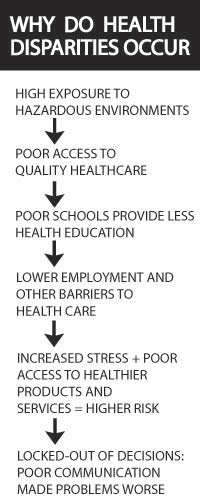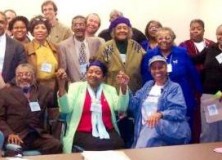According to the National Institutes for Health, health disparities are differences in the incidence, prevalence, mortality and other adverse health conditions that exist among specific population groups in the United States.
They occur from a deadly cocktail of social, economic, behavioral and medical factors:
- The historical evolution of healthcare for persons of color
- The current financial and organizational structures of health systems
- The settings in which care is delivered
The nature of the medical workforce providing care may both independently or jointly influence the quality of care the minorities receive.
Since social factors fundamentally influence health outcomes, we as health practitioners cannot hope to improve quality of life by neglecting issues of social inequality. Accomplishing this task requires involving those community members who have most borne the burden of inequality. Otherwise, distrust of an apparently insensitive and neglectful power structure will surely undermine efforts to improve health status.
HEALTH DISPARITIES IN THE SOUTHEAST
The states that make up the southeastern United States rank nationally in the bottom third for all key indicators of health. When one looks at African Americans and other ethnic “minority” populations in this region, the picture is even bleaker. Moreover, the South’s healthcare infrastructure is one of the weakest in the nation and the avenues for its citizens to take action to improve their quality of life is torturous.
The challenge of eliminating health disparities calls us to expand our ways of thinking about what to research and how to do it. Two approaches, interdisciplinary research and community participatory techniques, have shown exciting promise in reducing health disparities. Moreover, community participatory projects have not only identified new solutions, but also improved buy-in by communities of both new and traditional health interventions (Minkler, M. & Wallerstein, N., eds. 2003. Community Based Participatory Research for Health. San Francisco: Jossey Bass.)
Poorer health profiles and outcomes for African Americans and other minorities present not only a medical challenge, but also a moral mandate for the United States. In the states of the old South, this challenge and mandate are especially urgent. Democratic and participatory processes can heal this social wound.


